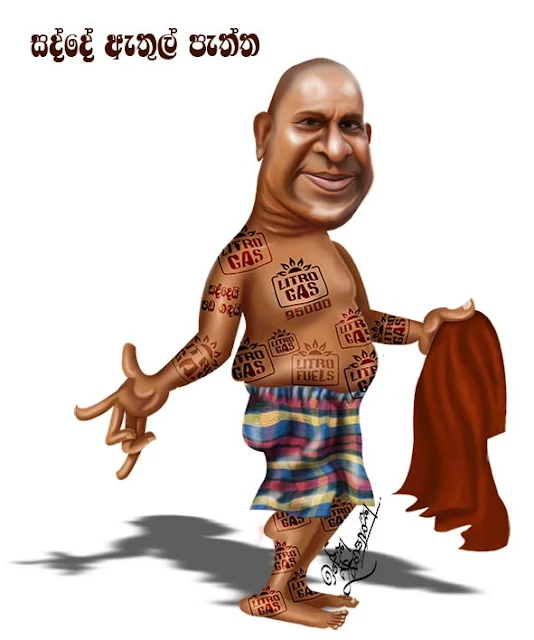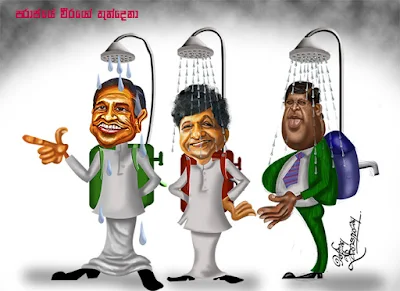Art and philosophy are two distinct yet interconnected fields that explore fundamental aspects of human existence and the world around us.
Friday, December 14, 2018
Saturday, December 1, 2018
Tuesday, November 27, 2018
Tuesday, November 20, 2018
Monday, November 5, 2018
Tuesday, September 25, 2018
Saturday, September 22, 2018
Sunday, August 19, 2018
Sunday, June 3, 2018
Thursday, March 15, 2018
Friday, March 2, 2018
Like Rathupaswala, Tambuttegama - a Marxist view රතුපස්වල වගේද තඹුත්තේගම - මාක්ස්වාදි බැල්මක්
According to a report published by the Environmental Conservation Trust, the Venigros factory (Dipped Products PLC – Venigros (Pvt) Ltd) operated by Dhammika Perera as the vice-president of the Haleys Group, which is run in Weliveriya, Rathupaswala area, is an illegal factory. The report requests, "On behalf of the people of Weliweriya, we request the relevant authorities to drink a drop of clean water for the people who were brutally killed by the army while engaged in a non-violent protest demanding a drop of clean water to drink or to pay respect to the people living in this area. To arrange for the immediate closure of the Venegros factory, which is being held illegally, to grant the right.
Monday, February 26, 2018
Saturday, February 17, 2018
Thursday, February 15, 2018
Tuesday, February 13, 2018
Sunday, February 11, 2018
Saturday, February 3, 2018
Let's celebrate 70 years of independence ( sri lanka)
Seven decades have passed since independence. If the life expectancy of a human being is considered to be 75 years, those born at the time of independence in 1948 have only approximately five years left to live. In this span of time, what we have not achieved is more than what we have not achieved.
One's prosperity in life is mainly measured on the basis of income. At the time of our independence, the per capita income was around 100 US dollars. Today, the per capita income is close to $4000. There were several important hopes in Sri Lanka during the period of independence. The main expectation was to make Sri Lanka self-sufficient in rice. Since then, we have constantly discussed this, and have given special consideration to this in the formulation of economic policies and in the preparation of budget documents. The development of agriculture had a great impact on the entire economy, and it was expected that the economic development we hope for can be achieved by making the country self-sufficient in rice.
Every government that came to power after independence acted on it, and due to the actions of the Gal Oya Movement, Colony Schemes, Mahaweli Movement, Kadinam Mahaweli Movement, etc., the country was able to become self-sufficient in rice in 2005. However, we could not continue to maintain that situation. Today, country rice is also imported for the people of our country.
At the time of independence, the highest positions in the country's regime were occupied by the aristocracy. The appointed ministers were also a group belonging to the rich and noble aristocracy of the society. So was our embassy. Common people meant that these people don't understand their own sorrow and smell of sweat. Due to the various reforms that took place after the free education system, equals were able to get appointed in all these sectors. But it is a problem whether the expected results were obtained after the administration and politics were handed over to the common people. The free education system is good, but we should think twice whether it has been able to achieve the welfare that we hope for.
At the time of independence, Sri Lanka was in a good place economically and in all aspects. It is true that industries, education, health, administration showed the highest progress. Many countries had considered Sri Lanka as the fastest developing country in Asia. Even Singapore developed after our ambition, but now it has advanced far beyond us. But because we didn't take advantage of the space we had in the beginning, we have reached the current unfavorable situation. Despite being talented, the results have been poor. Important opportunities for improvement may seem to have been lost on us. This situation could be seen till 1977.
At the time of independence, the population of our country was 7 million, today the population is 21 million. As the population grew, the complexity of economic and social problems increased. It is true that due to the open economy that started in 1977, there was rapid economic development. A growth rate of 8 percent was achieved for the first time in 1978, but the situation worsened due to riots and civil wars in 1983. Due to this, the prestigious institutions that were expecting to invest in this country missed the opportunity. They did not want to come to this country amid the political and social situation in the country. Due to the Tsunami tragedy in 2004, our economy came under great pressure.
After the end of the ethnic war in 2009, investors came to Sri Lanka from abroad, but they could not take proper advantage of them. It seemed that this golden opportunity was also lost due to various frauds and corruption. If the rulers of the country were interested in taking advantage of this opportunity and taking the country in the right direction, the situation of the country today should have been quite different from this. Politicians' lack of interest in gaining control over the country's economic development led to this pathetic situation.
Wednesday, January 17, 2018
Subscribe to:
Posts (Atom)
AD
Roma art
Featured Post
"The Price of Experience: Commodification in a Consumer-Driven Society"
In a consumer-driven world, many aspects of human experience—relationships, emotions, and even identity—can be commodified. This commodific...
.jpeg)
-
Medusa is a figure from Greek mythology, often depicted as a monstrous woman with snakes for hair and a gaze that turns onlookers into ston...
-
Prometheus is a complex character in Greek mythology, embodying various themes and ideas that have fascinated storytellers, philosophers, a...
-
Nero, the enigmatic Roman Emperor whose reign straddled the line between extravagance and tyranny, emerges from history as a figure shroude...




























